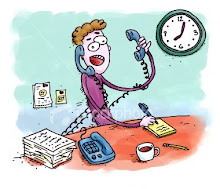Gazing into the crystal ball at the future of social media - what do we see? Extremely rapid changes in technology and interpersonal dynamics make it very hard to predict what changes will take place in social media. Some people try to predict the types of technology that will be invented and offered, or the types of platforms that will be used for people to interact with each other, and come up with complex ideas, theories and diagrams that are obsolete the moment the ink has dried.
My approach is perhaps a little different. I tend to think of the future as a pattern of waves - or cycles - what I mean is that the boom in social networks has exploded to the extent that there are so many ways that people can communicate with each other, but that some of these are getting so large they become unmanageable and the trend will be to shrink it down to make it work better. Take for example Facebook. Some facebook users may have thousands of 'friends' on their page, but how real are these 'friendships' and how much time can one person devote to any kind of meaningful dialogue with each person? It's just not possible. People will start to become more selective who they add to their page, in order to try and reclaim some quality personal time and communication with a select group. Fragmentation will become consolidation.
A similar story with Twitter - people try and keep up with so many 'tweets' from so many sources that eventually they will be unable to keep up with everything and begin to be more selective with whose tweets they follow. We can see this pattern already being applied inthe use of mobile phones - where people give out their number to certain people but not others, and don't answer the phone if the number is unfamiliar. Individuals will become so bombarded with social media they will start to withdraw from complex scenarios in the quest for personal quality time with specially chosen others.
Technological changes - expect also waves or cycles. We can see that has already occurred - screens shrink and then grow - computers got smaller and smaller, now the screens are getting larger again (think 24 inch monitors), tvs got smaller and have now become larger to give us huge plasma screens. Mobile phones got smaller and smaller, but now they have become slightly larger again to accommodate larger screens, (think iphone), and the ipad with its larger screen is probably just like an iphone on steroids.
Devices become more and more complex, but then will reach to a stage where they will be too overwhelming and become more streamlined. The iphone already has over 250,000 apps - far too unwieldy for most users to make proper use of. So again some consolidation will have to occur, otherwise the advantages of the technology will not be able to be fully realised and people will turn away to something simpler and more manageable. Anyway, that's just my two cents, for all its worth. In the meantime, we continue to use the technology the way that suits us and our lifestyles until we get to a point where we feel the need to adapt, and by then the technology will already be there waiting for us.







































